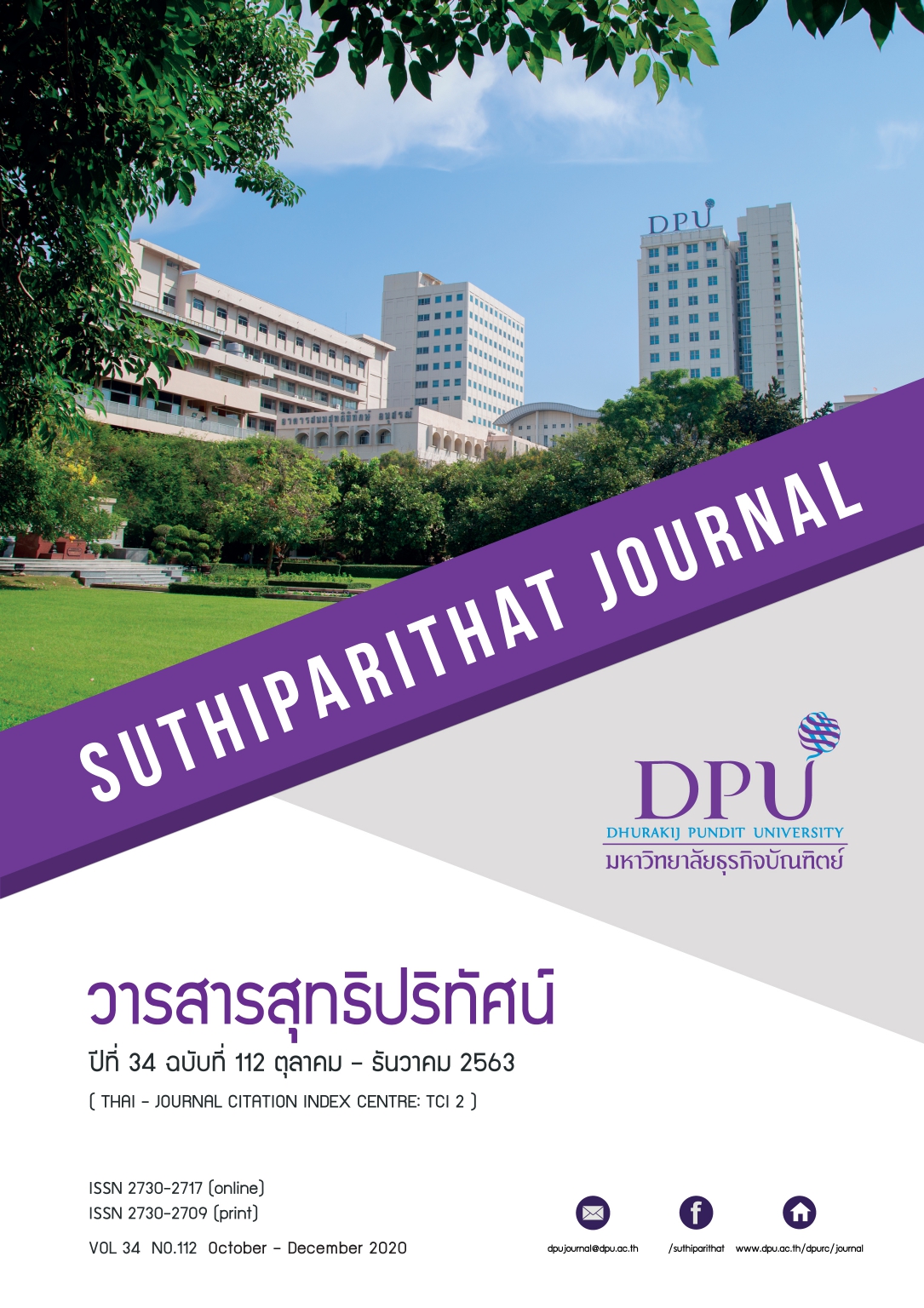ความสัมพันธ์ระหว่างค่านิยมการทำงานกับความเป็นผู้ประกอบการของเจเนอเรชั่นวายในเขตกรุงเทพมหานคร
คำสำคัญ:
ค่านิยมในการทำงาน, ความเป็นผู้ประกอบการ, เจเนอเรชั่นวายบทคัดย่อ
การวิจัยครั้งนี้เป็นการศึกษาค่านิยมการทำงาน ความเป็นผู้ประกอบการและความสัมพันธ์ระหว่างค่านิยมการทำงานกับความเป็นผู้ประกอบการของเจเนอเรชั่นวายในเขตกรุงเทพมหานคร สำหรับสร้างค่านิยมการทำงานที่ดีและเสริมสร้างลักษณะความเป็นผู้ประกอบการ เพื่อเป็นประโยชน์กับองค์กรรวมถึงบุคคลที่จะก้าวไปเป็นเจ้าของธุรกิจในอนาคต เครื่องมือที่ใช้ในการวิจัยครั้งนี้คือ แบบสอบถามออนไลน์ จากประชากรจำนวน 392 คน โดยสุ่มตัวอย่างแบบเฉพาะเจาะจง และให้คะแนนแบบมาตรวัดของลิเคร์ท (Five-Likert Scales) สถิติที่ใช้ในการวิเคราะห์ข้อมูลได้แก่ ค่าเฉลี่ย ค่าสัมประสิทธิ์สหสัมพันธ์ และค่าสัมประสิทธิ์แอลฟ่าของครอนบาค ด้วยโปรแกรมสำเร็จรูปทางสถิติ
ผลการวิจัยพบว่า ประชากรเจเนอเรชั่นวายในเขตกรุงเทพมหานคร ให้ความสำคัญกับค่านิยมการทำงานด้านสังคมและการช่วยเหลือผู้อื่นมากที่สุด รองลงมาตามลำดับคือ ด้านการทำงานภายใน, ด้านศักดิ์ศรี และด้านการทำงานภายนอก คิดเป็นคะแนนเฉลี่ย 3.87±0.75, 3.74±0.80, 3.72±0.76 และ 3.68±0.78 ตามลำดับ และมีคุณลักษณะผู้ประกอบการด้านความกล้าเสี่ยงมากที่สุด รองลงมาตามลำดับคือ การมีอิสระในการบริหารงาน ความมีนวัตกรรมและความกล้าที่จะแข่งขัน คิดเป็นคะแนนเฉลี่ย 3.62±0.78, 3.61±0.75, 3.60±0.79, 3.57±0.83 และ 3.44±0.88 ตามลำดับ ความกล้าเสี่ยงถือว่าเป็นคุณลักษณะสำคัญที่ใช้แยกผู้ประกอบการออกจากลูกจ้างนอกจากนี้ยังพบว่าค่านิยมการทำงานมีความสัมพันธ์เชิงบวกกับความเป็นผู้ประกอบการอย่างมีนัยสำคัญ ซึ่งหมายถึงยิ่งมีระดับค่านิยมการทำงานที่สูง ยิ่งมีความเป็นผู้ประกอบการมาก
เอกสารอ้างอิง
ศศิ อ่วมเพ็ง. (2558). ปัจจัยที่มีอิทธิพลต่อความตั้งใจลาออกของพนักงานระดับบังคับบัญชาสำนักงานบัญชีกลาง บริษัท ปูนซิเมนต์ไทย จำกัด (มหาชน). กรุงเทพฯ: มหาวิทยาลัยธรรมศาสตร์.
สำนักงานส่งเสริมวิสาหกิจขนาดกลางและขนาดย่อม (สสว). (2562). รายงานสถานการณ์วิสาหกิจขนาดกลางและขนาดย่อม ปี 2562. Retrieved from https://www.sme.go.th/th/download.php?modulekey=215
Anwar, I., & Saleem, I. (2019). Exploring entrepreneurial characteristics among university students: an evidence from India. Asia Pacific Journal of Innovation and Entrepreneurship, ahead-of-print. doi:10.1108/APJIE-07-2018-0044
Cho,Yun H., & Lee, Joo-Heon. (2018). Entrepreneurial orientation, entrepreneurial education and performance. Asia Pacific Journal of Innovation and Entrepreneurship, 12(2), 124-134. Retrieved from https://doi.org/10.1108/APJIE-05-2018-0028. doi:10.1108/APJIE-05-2018-0028
Davis, Elissa. (2016). Work value priority of millenial students. Eastern Michigan University, Retrieved from http://commons.emich.edu/honors
Hooi, H. C., Ahmad, N. H., Amran, A., & Rahman, S. A. (2016). The functional role of entrepreneurial orientation and entrepreneurial bricolage in ensuring sustainable entrepreneurship. Management Research Review, 39(12), 1616–1638. Retrieved from https://doi.org/10.1108/MRR-06-2015-0144. doi:10.1108/MRR-06-2015-0144
Indriyana, F., & Djastuti, I. (2018). Work values of generation Y. Diponegoro International Journal of Business, 1, 40. doi:10.14710/dijb.1.1.2018.40-48
Khandwalla, P. N. (1976/1977). Some top management styles, their context and performance. Organization and Administrative Sciences, 7, 21-51.
Lan, Q., & Wu, S. (2010). An empirical study of entrepreneurial orientation and degree of internationalization of small and medium sized Chinese manufacturing enterprises. Journal of Chinese Entrepreneurship, 2(1), 53-75. Retrieved from https://doi.org/10.1108/17561391011019023. doi:10.1108/17561391011019023
Lechner, C. M., Sortheix, F. M., Göllner, R., & Salmela-Aro, K. (2017). The development of work values during the transition to adulthood: A two-country study. Journal of Vocational Behavior, 99, 52-65. Retrieved from http://www.sciencedirect.com/science/article/pii/S000187911630104X. doi:https://doi.org/10.1016j.jvb.2016.12.004
Liang, Y. W. (2012). The relationships among work values, burnout, and organizational citizenship behaviors: A study from hotel front line service employees in Taiwan. International Journal of Contemporary Hospitality Management, 24. doi:https://doi.org/10.1108/09596111211206169
Lieberman, M. B., & Montgomery, D. B. (1988). First-mover advantages. Strategic Management Journal, 9(S1), 41-58. Retrieved from https://onlinelibrary.wiley.com/doi/abs/10.1002/smj.4250090706. doi:10.1002/smj.4250090706
Lumpkin, G. T., & Dess, G. G. (1996). Clarifying the entrepreneurial orientation construct and linking It to performance. The Academy of Management Review, 21(1), 135-172. Retrieved from www.jstor.org/stable/258632. doi:10.2307/258632
Lyons, S. T., Higgins, C. A., & Duxbury, L. (2010). Work values: Development of a new three-dimensional structure based on confirmatory smallest space analysis. Journal of Organizational Behavior, 31(7), 969-1002. Retrieved from https://onlinelibrary.wiley.com/doi/abs/10.1002/job.658. doi:10.1002/job.658
Mintzberg, H. (1973). Strategy-making in three modes. California Management Review, 16(2), 44-53. Retrieved from https://journals.sagepub.com/doi/abs/10.2307/41164491. doi:10.2307/41164491
Naim, M. F., & Lenka, U. (2018). Development and retention of Generation Y employees: a conceptual framework. Employee Relations, 40. doi:10.1108/ER-09-2016-0172
Ng Eddy, S. (2018). Work value priorities. In Lyons, Sean T. (Ed.), Generational career shifts (pp. 45-69). Emerald Publishing.
Okhomina, D. (2010). Entrepreneurial orientation and psychological traits: the moderating influence of supportive environment.
Rao Psv, B., & Urs, V. (2017). A study on work values of Gen Y workforce. International Journal of Lastest Engineering and Management Research (IJLEMR), 2(8), 62-66.
ดาวน์โหลด
เผยแพร่แล้ว
รูปแบบการอ้างอิง
ฉบับ
ประเภทบทความ
สัญญาอนุญาต
เนื้อหาและข้อมูลในบทความที่ลงตีพิมพ์ในวารสารสุทธิปริทัศน์ ถือเป็นข้อคิดเห็นและความรับผิดชอบของผู้เขียนบทความโดยตรงซึ่งกองบรรณาธิการวารสาร ไม่จำเป็นต้องเห็นด้วย หรือร่วมรับผิดชอบใด ๆ
บทความ ข้อมูล เนื้อหา รูปภาพ ฯลฯ ที่ได้รับการตีพิมพ์ในวารสารสุทธิปริทัศน์ ถือเป็นลิขสิทธิ์ของวารสารสุทธิปริทัศน์หากบุคคลหรือหน่วยงานใดต้องการนำทั้งหมดหรือส่วนหนึ่งส่วนใดไปเผยแพร่ต่อหรือเพื่อกระทำการใด ๆ จะต้องได้รับอนุญาตเป็นลายลักษณ์อักษรจากวารสารสุทธิปริทัศน์ก่อนเท่านั้น







